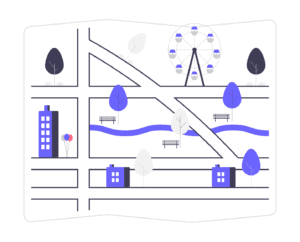AI Marketing
Ready or Not: How to Be Found in AI Search

We asked a new client how they found us a few months back. Their response? ChatGPT. That answer took us by surprise. We didn’t realize potential clients could discover us through AI search, and it sparked a deep dive into how these platforms are shaping the way organizations connect with their audiences.
If AI search is already working behind the scenes, the real question is: are you showing up where your audience is looking?
We’re going to explore how AI search is reshaping digital discovery and share three ways you can start positioning your organization for better visibility right now.
How AI Platforms Display Search Results
AI-driven platforms like ChatGPT, Bing Chat, and Google’s Gemini are revolutionizing search by prioritizing conversational and intent-based queries. Unlike traditional search engines, they:
-

Pull from training data, live browsing (if enabled), and APIs to generate responses.
- Use context to deliver direct answers instead of just links.
- Prioritize credibility, structured data, and high-value content when determining what to display.
With AI-powered search evolving rapidly, it’s no longer just about ranking on Google—it’s about being present in AI-generated conversations.
Additionally, new players are entering the AI search space. Meta Platforms has announced plans to launch a standalone AI search app in the second quarter of 2025, which could introduce new competition and opportunities for organizations looking to expand their visibility. New AI platforms are emerging almost daily, creating opportunities for smaller organizations to compete with larger players in ways that were previously unimaginable.
Why This Matters for Your Organization
Traditional search engines rely on keywords and rankings, but AI search changes the game by interpreting intent and pulling information dynamically. This shift presents new opportunities:
- Expanded Discovery – Users asking AI platforms questions relevant to your industry may be introduced to your organization without searching for you directly.
- Enhanced Credibility – AI platforms prioritize authoritative sources, making your content more valuable when properly structured.
- Higher Engagement – AI-generated responses often provide direct answers, making it easier for audiences to engage with your organization faster.
However, legal and market dynamics are also shaping AI search. For example, Google’s AI Overviews have come under scrutiny, with companies like Chegg suing Google for allegedly harming their traffic and revenues. Understanding these challenges can help organizations anticipate shifts in AI-driven discovery.
How AI Search Puts You on the Map
Just like optimizing for traditional search engines, visibility in AI search requires strategic efforts. Here’s what makes the biggest impact:
- Structured Data Wins – AI platforms favor well-organized, structured content. Using schema markup and clear metadata increases your chances of being referenced.
- Conversational Content Matters – AI tools process natural language better than keyword-stuffed pages. Write in a way that aligns with how real people ask questions.
- Authority Signals Are Key – AI prioritizes reputable sources. Building backlinks, getting mentioned in trusted articles, and maintaining accurate business profiles improves your credibility.
In addition, new optimization techniques are emerging. Generative Engine Optimization (GEO) focuses on refining content specifically for AI-generated search results, and brand mentions—rather than just backlinks—are becoming a key factor in AI search visibility.
3 Keys to Show Up in AI Search Right Now
- Audit Your Online Presence – Review where and how your organization appears in AI search results and Google’s evolving SERPs.
- Create and Refresh Content – Publish content that answers audience questions directly and update older pages to align with AI and Google search trends.
- Leverage Multiple Platforms – Expand beyond Google to find if your information is accurate on AI-powered tools like ChatGPT, and Bing Chat.
AI search isn’t just the future—it’s happening now. Organizations that understand how to optimize for AI-driven discovery will be the ones capturing new audiences in ways traditional search alone can’t. The best part? Many of these strategies overlap with best practices for Google and other platforms, making AI optimization a natural extension of a strong digital presence.
With AI search engines rapidly evolving and new players like Meta entering the space, staying ahead of trends and adapting to these shifts will be critical. To start the conversation today, reach out to HyFyve.
To learn more about how AI is revolutionizing other area of marketing, check out 5 Examples of AI Marketing by Big Brands.



